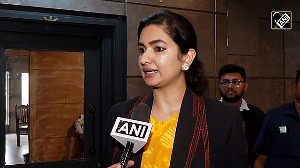The US investigators have zeroed in on a Pakistani national, who is suspected to be a key link between LeT operatives David Coleman Headley and Tahawwur Hussain Rana about whom India is expected to know in a week whether they were involved in Mumbai attacks.
The US also believes some elements in Pakistan's Inter Services Intelligence could be linked to Headley, while agencies in India have been suspecting that the two Lashkar-e-Tayiba operatives could have been involved in the Mumbai attacks.
There is no evidence so far to link the duo with the 26/11 attacks, sources said.
India and the US are in constant touch on the Headley case and Washington has conveyed that within a week there could be "authentic" information whether they were involved in the 26/11 attacks, sources said.
A Pakistani national believed to be a common link between the LeT handlers like Zaki-ur Lakhvi and the two terror suspects detained by the Federal Bureau of India has been identified and probe on him is expected to reveal whether Headley and Rana had any role.
The Pakistani national, whose identity has been kept secret, is believed to have been in Pakistan at the time of November attacks in Mumbai.
Headley, a Pakistan-born US citizen, and Rana, Pak-born Canadian citizen, were arrested last month by the FBI for allegedly plotting terror attacks in India and Denmark.
Indian investigators have found that the duo had visited India a number of times and toured various places apparently to conduct recce.
Against the backdrop of Headley case, India wants the US to lean more on Pakistan to end terrorism, including those directed against New Delhi.
The US believes that some elements of ISI could have links with Headley. This belief is based on the arrest of "two key persons" in Pakistan, sources said.
Illyas Kashmiri, a former Pakistani military officer who has become a militant commander associated with both the Al Qaeda and the LeT, has been detained in Pakistan.
The US feels Pakistan is doing good work in South Waziristan, but is not sure whether Pakistan was targeting north Waziristan.
The US has received assurances from Pakistan that it is committed to defeating all forms of terrorism, but was not sure whether it included those directed against India.
These issues are understood to have come up for discussions during the meeting between the Central Intelligence Agency chief Leon E Panetta and National Security Adviser M K Narayanan.
Narayanan also discussed the situation in Afghanistan and Pakistan and the US policies relating to the two countries.
Sources said India has a stake in the developments in Afghanistan and Pakistan considering the terrorism emanating from there.
The success of the US' Af-Pak policy is vital for India, as the victory of Taliban could have grave consequences.
The US anticipates terrorism in Afghanistan to witness a surge after the new government headed by Hamid Karzai and is planning to increase its forces substantially soon.
The US feels that its military campaign will have results in 12 to 18 months, the sources said. The US is also going to announce its new Af-Pak policy soon.
India feels that Karzai government should also be allowed a chance to succeed in its efforts, the sources said.





